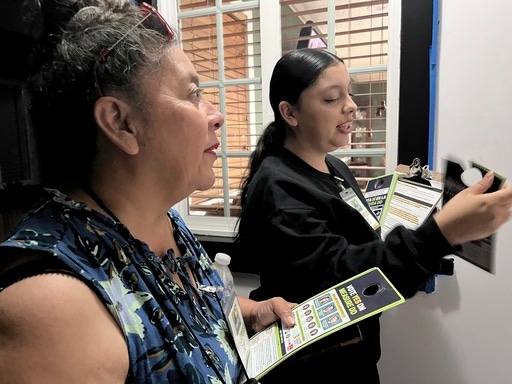SANTA ANA, Calif. (AP) — Voters in a Southern California city rejected a measure that would have allowed residents who aren’t U.S. citizens to vote in local elections.
Measure DD was rejected by 60% of the voters in Santa Ana, a city of about 310,000 in Orange County that’s southeast of Los Angeles, the Los Angeles Times reported Monday.
Santa Ana, a predominantly Latino community, had more votes for Vice President Kamala Harris than President-elect Donald Trump. Experts say the rejection of the measure may indicate that voters, especially Latino voters, are shifting their attitudes about immigration.
“This is kind of in line with trends we’ve been seeing in both polling and elections of the Latino community getting more conservative on issues of immigration,” said Jon Gould, dean of the School of Social Ecology at the University of California, Irvine.
The measure faced steep opposition from local officials and conservative groups such as Policy Issues Institute, which claimed it would be costly and litigious and upend citizens’ rights.
Carlos Perea, an immigrant rights advocate who supported the measure, said those groups “hit the panic button.”
The results reflect Trump’s influence in a year when the former president campaigned heavily against illegal immigration said Perea, executive director of the Harbor Institute for Immigrant and Economic Justice.
It’s illegal for people who are not U.S. citizens to vote for president or other federal offices, and there is no indication of widespread voter fraud by citizens or noncitizens, though many leading Republicans have turned the specter of immigrants voting illegally into a major issue. They argue that legislation is necessary to protect the sanctity of the vote.
But a growing number of communities across the United States are passing laws allowing residents who aren’t U.S. citizens to vote in local elections, such as city council and mayoral races. Supporters say it’s only fair since they live in the communities and pay taxes.
San Francisco passed Proposition N in 2016 to allow noncitizens with children under 18 years old to vote in school board elections. Prop N passed after two similar measures were rejected in 2004 and 2010.
Other states with municipalities that allow residents without citizenship to vote include Maryland, Vermont, and recently, Washington, D.C., New York City granted local voting rights to noncitizens in 2022, but a state judge struck down the law months later and stopped it from ever going into effect. The city is now in the process of appealing the decision.
Copyright 2024 The Associated Press. All rights reserved. This material may not be published, broadcast, rewritten or redistributed without permission.
Note: Thank you for visiting our website! We strive to keep you informed with the latest updates based on expected timelines, although please note that we are not affiliated with any official bodies. Our team is committed to ensuring accuracy and transparency in our reporting, verifying all information before publication. We aim to bring you reliable news, and if you have any questions or concerns about our content, feel free to reach out to us via email. We appreciate your trust and support!
